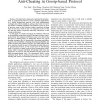Free Online Productivity Tools
i2Speak
i2Symbol
i2OCR
iTex2Img
iWeb2Print
iWeb2Shot
i2Type
iPdf2Split
iPdf2Merge
i2Bopomofo
i2Arabic
i2Style
i2Image
i2PDF
iLatex2Rtf
Sci2ools
104
click to vote
ICC
2007
IEEE
2007
IEEE
An Experimental Study on Cheating and Anti-Cheating in Gossip-Based Protocol
Abstract—The Internet has witnessed a rapid growth in deployment of gossip-based protocol in many multicast applications. In a typical gossip-based protocol, each node independently exchanges data with its neighbors, acting as dual roles of receiver and sender to facilitate scalability and resilience. However, most of previous work in this literature seldom considered cheating issue of end users, which is also very important in face of the fact that the mutual cooperation inherently determines overall system performance. In this paper, we mainly investigate the dishonest behaviors in decentralized gossip-based protocol through extensive experimental study. Our original contributions come in two-fold: In the first part of cheating study, we analytically discuss two typical cheating strategies, that is, intentionally increasing subscription requests and untruthfully calculating forwarding probability, and further evaluate their negative impacts. The results indicate that more attentio...
| Added | 02 Jun 2010 |
| Updated | 02 Jun 2010 |
| Type | Conference |
| Year | 2007 |
| Where | ICC |
| Authors | Yun Tang, Nan Zhang, Yuanchun Shi, Shiqiang Yang, Yuzhuo Zhong |
Comments (0)

